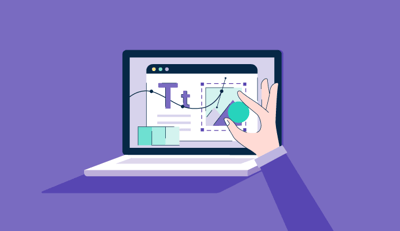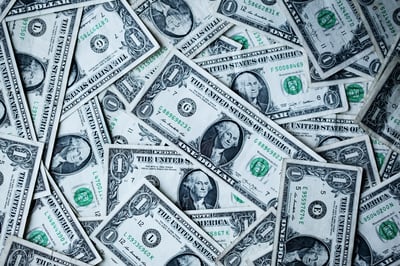.jpg?width=600&name=iStock-1191609321%20(1).jpg)
In school, you'll often learn that graphic design is all about making things look pretty.
However, there's more to graphic design than creating something visually appealing. Graphic designers, in a nutshell, are creative problem-solvers. Graphic design is often thrown around as an umbrella term, but the variations of design beneath that umbrella require a slight variation in skillsets, knowledge, and graphic design software.
The 10 types of graphic design are:
Whether you're a company looking to hire your first designer or an aspiring graphic designer thinking about specializing in a particular type, this article will help you understand graphic designers' roles in various industries.
If you're interested in starting your career as a full-time or freelance graphic designer, becoming familiar with some of the different types of graphic design will be valuable to your job exploration.
Keep reading to learn more about the different graphic design types, examples, and what the deliverables for each type look like. You'll also learn about the various job titles for each category, average salary, and career outlook.
Marketing and advertising professionals would be nothing without their graphic designers. Creative directors and art directors are responsible for things as small as brochure design concepts for designing small marketing materials like brochures and business cards, and large projects like entire advertising campaigns.
Visual content is engaging, and companies rely on effective graphic design in order to tap into the buying decisions of consumers.
These types of designers work with various mediums in order to effectively meet the needs and wants of their clients. While graphic design in the advertising and marketing industries has traditionally been print-centered, it's rapidly expanding to include digital assets.
Understanding how to design for both print and digital is crucial for designers looking to break into advertising so that they can confidently meet the needs and wants of any client.
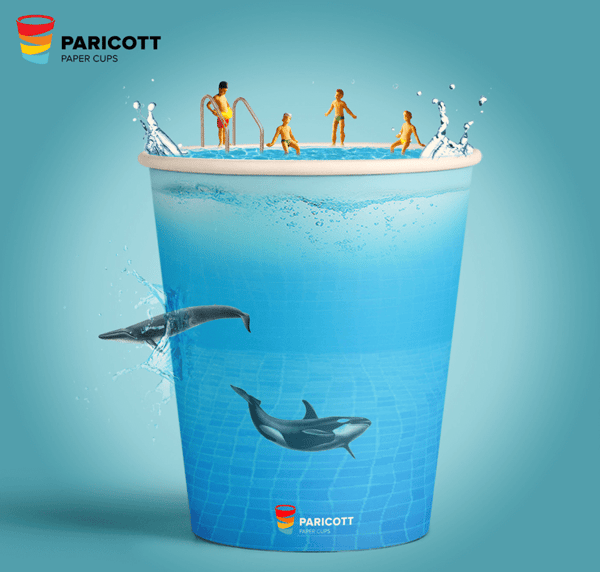
Source: Epiic
Social media graphics, email marketing templates, and content marketing are just some of the digital uses of marketing and advertising design.
According to the U.S. Bureau of Labor Statistics, the median annual wages for graphic designers in advertising and marketing is $61,300 as of May 2024.
The median wage is the wage at which half the workers in an occupation earned more than that amount and half earned less. It could be higher or lower depending on the job description, years of experience, and location.
Salary.com estimates the salary range of a marketing graphic designer in the U.S.A. typically falls between $56,065 and $164,238.
The current job market may lead to more demand for graphic designers in digital marketing. However, the need for graphic designers in advertising and corporate branding may experience a slump in the coming years.
Environmental graphic design embraces elements from multiple disciplines in order to connect people to the places they visit. This may sound idyllic, but by combining graphic, architectural, interior, landscape, and industrial design, environmental graphic designers are able to enhance a person’s experience. Improvements are typically done by making the environment more memorable, informative, or easier to navigate.
Wayfinding, which includes signage or visual cues to indicate where people are and where they should be going, is the core purpose of environmental design. However, its uses go beyond that, such as acting as a communicator for organizations to tell a story or relay a meaningful message to visitors.
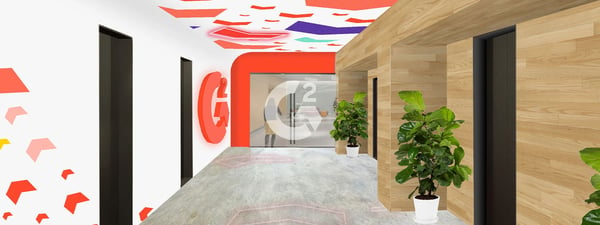
In order to create designs with this level of sophistication, those who have environmental design jobs must have an understanding of and experience with both graphic design and architecture.
Associate designer: Associate designers for environmental design are entry-level graphic designers. This position is a great place for recent graduates to get their feet wet in the world of environmental design.
Draftsman: Drafters work to convert the designs that associate designers, architects, and engineers into drawings. This job becomes a little more technical than the typical graphic design job and requires specialization in architectural, electrical, or mechanical drafting.
According to the U.S. Bureau of Labor Statistics, the median annual pay for drafters is $65,380 per year, or $31.44 per hour.
The employment of urban and regional planners is expected to grow by 4 percent from 2022 to 2032. Recent events have provided an excellent opportunity for environmental designers to take transformative actions towards creating resilient, sustainable urban areas.
Publication design traditionally refers to print medium– such as books, magazines, newspapers, etc. However, like many other subsets of graphic design, technological advances have led to new opportunities for its potential use.

Source: Visme
Digital publication design utilizes traditional elements of art such as color, typography, and space. Publication designers are able to thoughtfully combine these elements to create content that is able to be perceived visually, on a digital platform. This includes eBooks, email newsletters, magazine layouts, and more.
Most people who have a publication design job work for a publishing company, as a freelancer or as a part of a creative agency.
According to the U.S. Bureau of Labor Statistics, the median pay for desktop publishers is $53,620 per year, or $25.78 per hour.
As companies hire fewer desktop publishers and hire other graphic designers with other specialties, such as web designers, to do desktop publishing tasks, the U.S. Bureau of Labor Statistics projects that demand for desktop publishers will decline by around 19 percent from 2019 to 2029.
If you're not involved in the field of graphic design, you must be asking yourself “what is motion design?” However, this fairly new graphic design style is much less confusing than its name suggests and has become a versatile style choice for graphic designers.
Source: Francis.J Motion Design
Motion design is the generation of pieces of digital graphics, which create the illusion of motion or rotation. You can find traditional uses of motion design the opening of movies, television shows or news productions. Today, examples of motion design are found across all digital platforms, such as in GIFs, apps, website design, and more.
Within the last ten years, motion design has increased in popularity as our society continues to digitize. Technological advancements have given designers the opportunity to explore the value that this medium has to offer. Be sure to stay on top of the latest design trends to keep one step ahead of the competition.
Motion graphics designer: These designers are trained in traditional graphic design and integrate other elements into their existing knowledge of design. They may also come from a background in filmmaking or video production, with the ability to use 2D or 3D animation video styles to enhance static graphics.
According to the U.S. Bureau of Labor Statistics, the median pay for motion designers is $97,940 per year.
Demand for animators and special effects artists is projected to grow four percent (about as fast as other jobs) from 2023 to 2033. Projected growth is due to increased demand for visual effects in video games, TV, and films.
Corporate design is utilized by organizations to express the relationship between a brand and its audience. The visual elements of a brand identity act as the company’s face for communicating its tone, personality, and essence. Intangible design elements such as color, shapes, and imagery all elicit certain feelings for an audience and dictate how a consumer perceives the brand.
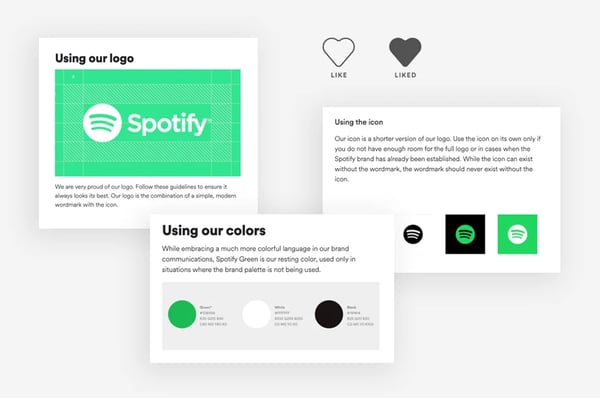 Source: Wix
Source: Wix
Keeping a brand consistent is essential to corporate design, since consumers respond to recognizable visual media. Typically, within corporate identity design, designers collaborate with brand stakeholders to create products such as typography, logos, color palettes, and illustration libraries.
Then, designers will create a corporate design guideline, to ensure that the visual brand identity is applied consistently throughout all current and future applications.
According to Glassdoor, the average base pay for corporate designers falls between $45,000 and $83,000 annually.
Like graphic designers, demand for corporate designers is projected to slump down to four percent from 2019 to 2029, mainly because of tight competition for available positions.
Think about the last time you used an app on your phone. From the moment you open your phone, access the app, and close your phone, you just came across what user interface (UI) design is all about.
In a nutshell, user interface (UI) design focuses on the aesthetic and style of a user interface, whether it's a hardware device (mouse, trackpad, keyboard, printer, and more) or a software application (app, browser, and more).
UI designers are concerned with the layers of interaction that appeal to the human senses (sight, touch, hearing, and more). For UI graphic designers, every visual element that a user will potentially interact with must be thoughtfully designed to optimize an interface's usability. These include screen graphic elements like buttons and menus.
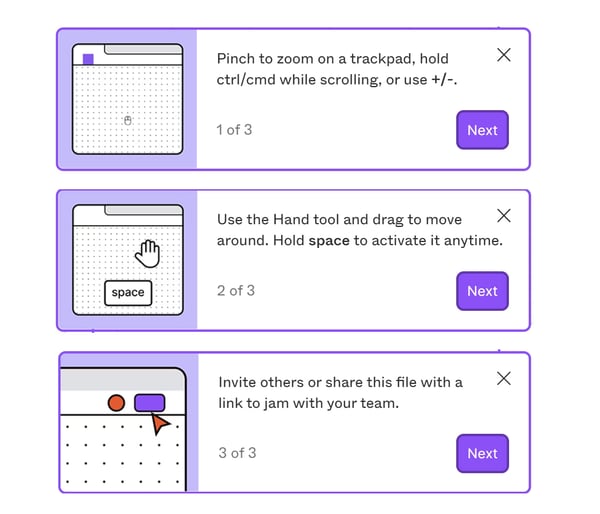 Source: Maze
Source: Maze
UI designers tend to adhere to certain design principles and usability to balance aesthetic appeal and functionality. Graphic designers who focus on UI design tend to specialize in web apps, mobile apps, and games.
According to CareerFoundry, the average annual salary for UI graphic designers is $77,962 in the USA; €46,392 in Germany; and Rs 4,61,410 in India.
With the rise of big data, artificial intelligence, VR, and AR, UI designers will have a growing demand. They play a critical role in ensuring that user interfaces are accessible, usable, and aesthetically appealing.
Page layout, choosing images, and deciding on the best typography for a website are all part of web design.
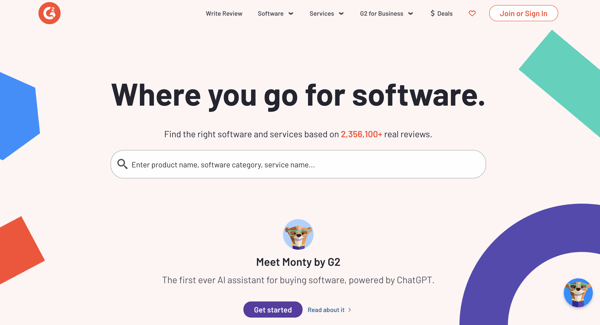 Source: G2
Source: G2
Web design ties closely with UI design and UX design, which aims to create an interface that balances aesthetic appeal on the front end page with optimal usability. Well-executed graphic design website examples often highlight how thoughtful layouts and visual hierarchy contribute to overall user experience.
Web designer: these people employ concepts of graphic design in order to create a responsive web design that has a cohesive web user interface through the use of UX and UI design.
According to Indeed.com's survey, the average annual salary of web designers in the U.S. $55,956. Graphic designers with six or more years of experience in the field can qualify for senior-level roles, where the salary bumps up to $101,931.
Employment of web developers and designers is projected to grow eight percent (much faster than other occupations) from 2019 to 2029. The immense growth can be attributed to the rise of e-commerce, online shopping, and the increase in mobile device usage.
When you look on the shelves of any retailer, grocery store, etc., nearly every item comes in some sort of packaging. While this packaging serves as protection for merchandise, companies also recognize the opportunity that product packaging design presents.
Through strategically implementing color, shape, and typography, packaging becomes a way for companies to communicate their brand's personality and story directly to their consumers.
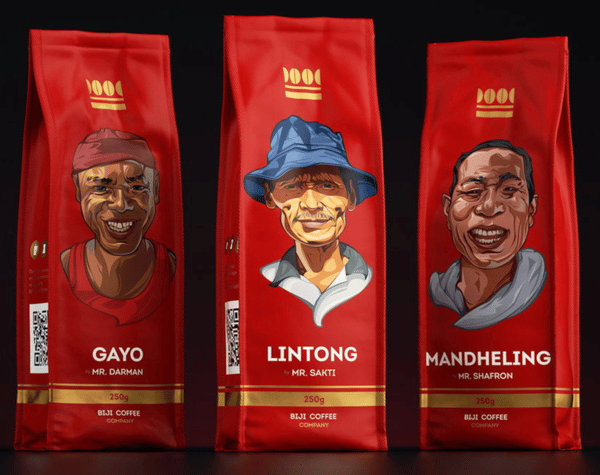 Source: Dieline
Source: Dieline
Retail, makeup, and food packaging design are just a few of the countless industries where this style of design is a valuable marketing tool. Effective packaging design has the ability to give a product “shelf impact,” which can greatly boost sales for a company. For packaging designers, this means it is crucial to have a keen understanding of not only graphic design, but also successful product marketing tactics.
The average annual salary for a graphic designer specializing in packaging design in the U.S is $79,500.
Like graphic designers who specialize in marketing and advertising, recent events may slow down the demand for packaging designers for the next couple of years. Prospects will be best for designers who keep up with the latest design trends, tools, and techniques.
3D graphic design involves creating three-dimensional visuals that add depth and realism to digital content. Unlike traditional 2D design, 3D design allows objects to be viewed and manipulated in three dimensions, making it essential for industries like video games, film, product visualisation, and virtual reality (VR).
3D graphic design uses specialised software to model, texture, animate, and render objects and environments. This field requires a blend of artistic skills and technical knowledge to bring ideas to life with realistic lighting, shadows, and movement.
According to recent data from Indeed, the average base salary for a 3D designer in the United States is approximately $115,489 annually. Salary ranges from $58,945 on the low end to $226,274 for experienced specialists.
The demand for 3D graphic designers is skyrocketing, driven by increased use of VR/AR, video games, films, and e-commerce product visualization. Careers in this niche require continuous learning of evolving software and technologies, but offer strong entertainment, advertising, and industrial design opportunities.
The goal of information design as a practice is to help people make sense of data.
The Society for Experiential Graphic Design defines infographic design as a way of presenting information that makes it most accessible and easily understood by users.
From designing street signs to restaurant menus to patient record systems, information designers are likely to put the audience or user first instead of aesthetics or the quality of its appearance.
 Source: G2
Source: G2
Information design requires expertise and skills from a wide range of disciplines like visual design, infographic design, data visualization, technical writing, editing, and usability.
The average annual salary of information designers in the U.S. is $103,000, and the salary range typically falls between $87,000 and $145,000.
Employment of information designers in print is projected to decline significantly. In contrast, career outlook for information designers in the digital space is projected to be more positive than their print counterparts.
With a better understanding of where your graphic design skills can take you, it's not a bad idea to start taking a look at what opportunities are out there for you. Becoming a graphic designer in any of these areas is an unparalleled opportunity to leave your mark on the world.
Ready to elevate your publication projects? Check out our curated list of the best desktop publishing software to find the perfect fit for your needs.
This article was originally published in 2023. It has been updated with new information.
Kai Tomboc is an experienced content designer and writer on all things healthcare, design, and SaaS. She used to be a nurse and a telemarketer in her past lives. She lives for mountain trips, lap swimming, books, and conversations over beer.
Graphic design is the art of visually communicating ideas to inform, engage, or persuade an...
 by Jordan Wahl
by Jordan Wahl
As brands compete for attention, understanding the power of graphic design has never been more...
If you’re an office manager, or interested in becoming one, it’s important you know exactly...
 by Derek Doeing
by Derek Doeing
Graphic design is the art of visually communicating ideas to inform, engage, or persuade an...
 by Jordan Wahl
by Jordan Wahl
As brands compete for attention, understanding the power of graphic design has never been more...

